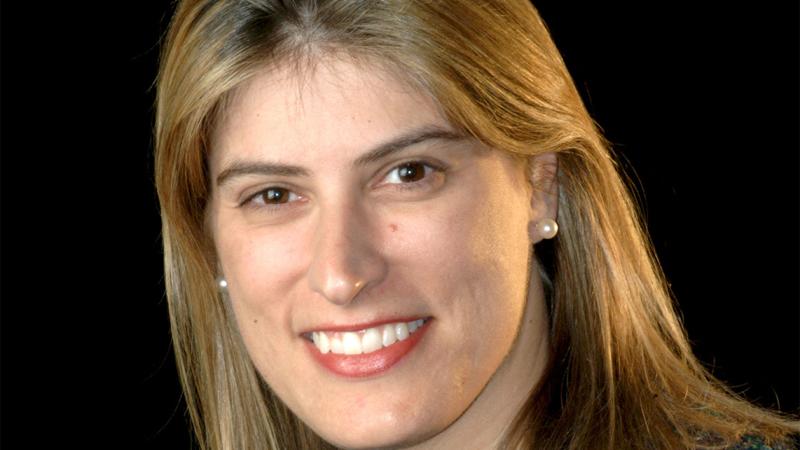Light and Health Expert Honored for Leadership in Research and Education
October 25, 2013

Mariana Figueiro, Lighting Research Center (LRC) Light and Health Program director and associate professor of architecture at Rensselaer Polytechnic Institute, has been elected a Fellow of the Illuminating Engineering Society (IES). The award is being presented at a special ceremony during the IES Annual Conference, Monday, October 28, in Huntington Beach, C.A.
“On behalf of the entire School of Architecture, I would like to congratulate Dr. Figueiro on her election as a Fellow of the Illuminating Engineering Society,” said Evan Douglis, Dean of the School of Architecture at Rensselaer. “This is an appropriate and well-deserved recognition for Mariana’s numerous and significant contributions to the discipline of lighting. She is a brilliant innovator within her area of expertise and we are proud to count her among our distinguished faculty at Rensselaer.”
“Mariana Figueiro is known world-wide as an expert in the field of light and health for her work on light, circadian rhythms and human performance,” said William Hanley, Executive Vice President of the Illuminating Engineering Society of North America. “Her work has involved studies in multiple application settings related to these topics, including truck drivers, night shift nurses, and students. Her studies and papers are carefully designed and articulated. In her position at the Lighting Research Center, she plays a key role in the education and mentoring of graduate students who study lighting. She is an excellent speaker and based on her teaching evaluations has rated very high in the classroom by her students. Her contributions to the development of the Daysimeter and examples of its use provide both a tool and protocol for other researchers to apply in their study of the effects of light exposure on people. Her significant contributions to the field of lighting clearly qualify her to receive the honorary award of IES Fellow.”
Figueiro is also the recipient of the 2007 NYSTAR James D. Watson Award, the 2008 Office of Naval Research Young Investigator Award, and the 2010 Rensselaer Polytechnic Institute James M. Tien ’66 Early Career Award for Faculty. She is the author of more than 60 scientific articles in her field of research, along with the AARP-sponsored publication, Lighting the Way: a Key to Independence, which provides guidelines for the design of lighting to meet the needs of older adults. One of her papers was recently chosen for Best of Sleep Medicine 2011: An Annual Collection of Scientific Literature. Figueiro has developed a 24-hour lighting design plan to help improve sleep quality in older adults and has conducted groundbreaking research in the use of lighting to improve postural stability among older populations. She is also working with the U.S. Navy to investigate how light can increase performance and alertness in submariners.
Her work has received funding from the National Institutes of Health (NIH), including two R01 grants from the National Institute on Aging, and several grants from other NIH Institutes, including the Eunice Kennedy Shriver National Institute of Child Health and Human Development, National Institute on Drug Abuse, National Cancer Institute, National Institute of Nursing Research, and National Center for Complementary and Alternative Medicine; along with the U.S. Special Operations Command, Naval Medical Submarine Research Laboratory, Office of Naval Research, IES Research Grant, U.S. Green Building Council, U.S. General Services, Philips Lighting, Philips Respironics, OSRAM SYLVANIA, GE Lighting, Ketra, Acuity Brands, and Seoul Semiconductors.
Figueiro holds a B.S. in architectural engineering from the Federal University of Minas Gerais, Brazil, and a M.S. in lighting and Ph.D. in multidisciplinary science from Rensselaer.
For more information on Figueiro’s research at Rensselaer, visit:
LRC Light and Health Program
http://www.lrc.rpi.edu/programs/lightHealth/index.asp
Exposure to Light Could Help Alzheimer's Patients Sleep Better http://www.lrc.rpi.edu/resources/newsroom/pr_story.asp?id=231
Red Light Increases Alertness During "Post-Lunch Dip" http://www.lrc.rpi.edu/resources/newsroom/pr_story.asp?id=253
Light from Self-Luminous Tablet Computers Can Affect Evening Melatonin, Delaying Sleep http://www.lrc.rpi.edu/resources/newsroom/pr_story.asp?id=235
Blue Light Could Help Teenagers Combat Stress http://www.lrc.rpi.edu/resources/newsroom/pr_story.asp?id=243
About the Lighting Research Center
The Lighting Research Center (LRC) at Rensselaer Polytechnic Institute is the world’s leading center for lighting research and education. Established in 1988 by the New York State Energy Research and Development Authority (NYSERDA), the LRC has been pioneering research in energy and the environment, light and health, transportation lighting and safety, and solid-state lighting for more than 25 years. In 1990, the LRC became the first university research center to offer graduate degrees in lighting and today the LRC offers both a M.S. in lighting as well as a Ph.D. to educate future leaders in lighting. Internationally recognized as the preeminent source for objective information on all aspects of lighting technology and application, LRC researchers conduct independent, third-party testing of lighting products in the LRC’s state of the art photometric laboratories, the only university lighting laboratories accredited by the National Voluntary Laboratory Accreditation Program (NVLAP Lab Code: 200480-0). LRC researchers are continuously working to develop new and better ways to measure the value of light and lighting systems, such as the effect of light on human health, and the effect of light on plant physiology. The LRC believes that by accurately matching the lighting technology and application to the needs of the end user, it is possible to design lighting that benefits both society and the environment.